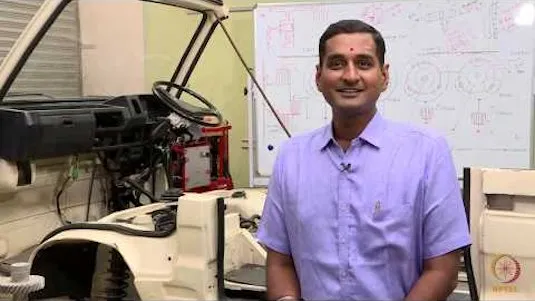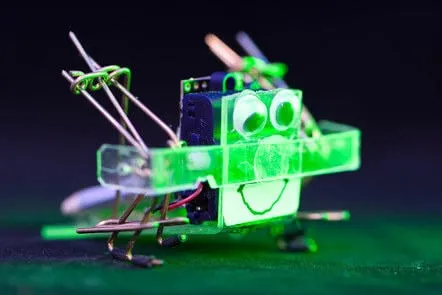
Fundamentals of Automotive Systems 
This course provides a fundamental understanding of the various systems of a typical automobile. It covers topics such as the design and layout of each system, and the application of mathematical models to synthesize the systems. It is intended for 3rd/4th year undergraduate and 1st year M.Tech./M.S./Ph.D. students, and requires prior knowledge of Rigid Body Dynamics, Thermodynamics, and Fluid Mechanics. ▼
ADVERTISEMENT
Course Feature
![]() Cost:
Cost:
Free
![]() Provider:
Provider:
Swayam
![]() Certificate:
Certificate:
Paid Certification
![]() Language:
Language:
English
![]() Start Date:
Start Date:
22nd Jan, 2023
Course Overview
❗The content presented here is sourced directly from Swayam platform. For comprehensive course details, including enrollment information, simply click on the 'Go to class' link on our website.
Updated in [March 20th, 2023]
This course, Fundamentals of Automotive Systems, provides a fundamental understanding of the various systems of a typical automobile. At the end of the course, the participant should be able to acquire fundamental knowledge of the various systems of an automobile, associate the functions of each system with its design and layout, depict the various systems using simple schematics, and apply concepts learnt in core undergraduate courses to synthesize mathematical models of the various systems. This course is intended for 3rd/4th year undergraduate and 1st year M.Tech./M.S./Ph.D. students and requires prerequisites of Rigid Body Dynamics (done in 1st year BE), Thermodynamics, and Fluid Mechanics.
[Applications]
Upon completion of this course, participants should be able to apply the knowledge acquired to analyze and design automotive systems. They should be able to use the schematics to understand the layout of the various systems and use the mathematical models to simulate the behavior of the systems. Additionally, they should be able to use the concepts learnt to develop new systems and components for automobiles.
[Career Paths]
1. Automotive Engineer: Automotive engineers are responsible for designing, developing, and testing the various components and systems of a vehicle. They must have a strong understanding of the fundamentals of automotive systems, as well as the ability to apply their knowledge to the design and development of new and innovative automotive technologies. The automotive industry is rapidly evolving, and automotive engineers must stay up to date with the latest trends and technologies in order to remain competitive.
2. Automotive Technician: Automotive technicians are responsible for diagnosing and repairing the various systems of a vehicle. They must have a strong understanding of the fundamentals of automotive systems, as well as the ability to apply their knowledge to the diagnosis and repair of vehicles. Automotive technicians must also stay up to date with the latest trends and technologies in order to remain competitive.
3. Automotive Designer: Automotive designers are responsible for creating the look and feel of a vehicle. They must have a strong understanding of the fundamentals of automotive systems, as well as the ability to apply their knowledge to the design of a vehicle. Automotive designers must also stay up to date with the latest trends and technologies in order to remain competitive.
4. Automotive Salesperson: Automotive salespeople are responsible for selling vehicles to customers. They must have a strong understanding of the fundamentals of automotive systems, as well as the ability to apply their knowledge to the sales process. Automotive salespeople must also stay up to date with the latest trends and technologies in order to remain competitive.
[Education Paths]
1. Automotive Engineering: Automotive engineering is a branch of engineering that focuses on the design, manufacture, and operation of automobiles and their components. Automotive engineering is a rapidly evolving field, with new technologies and advancements being made every day. Automotive engineers are responsible for developing and testing new technologies, such as electric and hybrid vehicles, autonomous driving systems, and advanced safety systems.
2. Mechanical Engineering: Mechanical engineering is a broad field that covers the design, development, and manufacture of a wide range of products and systems. Mechanical engineers are involved in the design and development of engines, powertrains, and other automotive components. They also work on the development of new technologies, such as electric and hybrid vehicles, autonomous driving systems, and advanced safety systems.
3. Electrical Engineering: Electrical engineering is a field of engineering that focuses on the design, development, and operation of electrical systems. Electrical engineers are responsible for the design and development of electrical components and systems for automobiles, such as powertrains, electrical systems, and other automotive components. They also work on the development of new technologies, such as electric and hybrid vehicles, autonomous driving systems, and advanced safety systems.
4. Computer Science: Computer science is a field of study that focuses on the design, development, and operation of computer systems. Computer scientists are responsible for the development of software and hardware for automobiles, such as powertrains, electrical systems, and other automotive components. They also work on the development of new technologies, such as electric and hybrid vehicles, autonomous driving systems, and advanced safety systems.
Course Provider

Provider Swayam's Stats at AZClass
Fundamentals of Automotive Systems provides a basic understanding of the various systems of a typical car. It covers topics such as the design and layout of each system, and the application of mathematical models to integrated systems. It is intended for third- and fourth-year undergraduates and first-year MS/MS/PhD students and requires prior knowledge of rigid body dynamics, thermodynamics, and fluid mechanics. Learners can learn the fundamentals of automotive systems from this course, including the design and layout of each system, the function of each system, and how to describe various systems using simple schematic diagrams.
Discussion and Reviews
0.0 (Based on 0 reviews)
Explore Similar Online Courses

Options Trading Essentials: The ULTIMATE Guides

Begin Robotics - Online Course

Python for Informatics: Exploring Information

Social Network Analysis

Introduction to Systematic Review and Meta-Analysis

The Analytics Edge

DCO042 - Python For Informatics

Causal Diagrams: Draw Your Assumptions Before Your Conclusions

Whole genome sequencing of bacterial genomes - tools and applications

Ergonomics In Automotive Design

Every Dashboard Warning Lights in Your Car Explained Part - 1


Start your review of Fundamentals of Automotive Systems